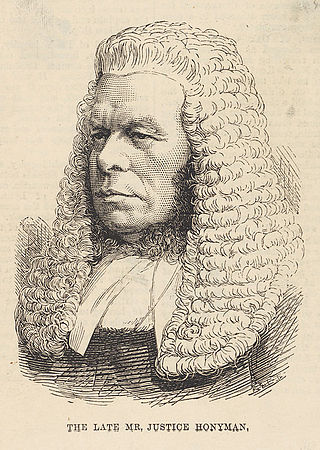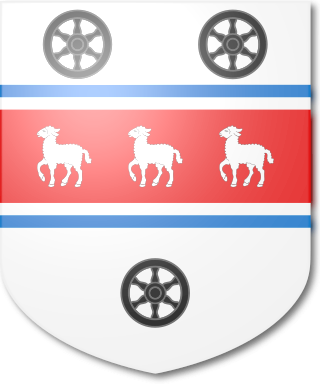Admiral Sir James Douglas, 1st Baronet was a Scottish naval officer and Commodore of Newfoundland.

The Eliott Baronetcy, of Stobs in the County of Roxburgh, is a title in the Baronetage of Nova Scotia. It was created on 3 December 1666 for Gilbert Eliott. The second baronet was a member of the pre-union Parliament of Scotland. The third Baronet sat as Member of Parliament for Roxburghshire. The Eliott Baronets share a common early Elliot ancestry with the nearby Earls of Minto (Elliot). It is thought that the surname spelling differences were contrived to differentiate the branches.

The Bunbury Baronetcy, of Bunbury, Oxon and Stanney Hall in the County of Chester, is a title in the Baronetage of England. It was created on 29 June 1681 for Thomas Bunbury, Sheriff of Cheshire from 1673 to 1674 and the member of an ancient Cheshire family. His grandson, Henry, the third Baronet, and great-grandson, the fourth Baronet, both sat as Members of Parliament for Chester. The latter died unmarried at an early age and was succeeded by his younger brother, the fifth Baronet. He was a clergyman. On his death in 1764 the title passed to his eldest son, the sixth Baronet. He represented Suffolk in the House of Commons for over forty years but is best remembered for his marriage to Lady Sarah Lennox. He died childless in 1821 and was succeeded by his nephew, the seventh Baronet. He was the son of Henry Bunbury, younger son of the fifth Baronet. The seventh Baronet was a distinguished soldier and politician. His eldest son, the eighth Baronet, was High Sheriff of Suffolk in 1868, and Fellow of the Royal Society. He died childless in 1886 and was succeeded by his younger brother, the ninth Baronet. He was Liberal Member of Parliament for Bury St Edmunds. He died unmarried in 1895 and was succeeded by his nephew, the tenth Baronet. He was the son of Colonel Henry William St Pierre Bunbury, third son of the seventh Baronet. He served as High Sheriff of Suffolk in 1908 and was a Deputy Lieutenant of the county. On his death in 1930 the title passed to his son, the eleventh Baronet. He was High Sheriff of Suffolk in 1936 and was a Deputy Lieutenant of the county. His son, the twelfth Baronet, was High Sheriff of Suffolk in 1972. As of 2014 the title was held by the latter's second but eldest surviving son, the thirteenth Baronet, who succeeded in 1985.
Sir George Brisbane Scott Douglas, 5th Baronet (1856–1935) was a Scottish poet and writer, as well as a Baronet.

The Honyman Baronetcy, of Armadale in the County of Orkney, was a title in the Baronetage of the United Kingdom. It was created on 19 May 1804 for William Honyman, a Lord of Session under the judicial title Lord Armadale. The second Baronet sat as Member of Parliament for Orkney. The fourth Baronet was a Judge of the Court of Common Pleas. The title became extinct on the death of the fifth Baronet in 1911.

The Scott baronetcy, of Great Barr in the County of Stafford, was a baronetcy created in the Baronetage of the United Kingdom on 30 April 1806 for Joseph Scott of Great Barr Hall, Member of Parliament for Worcester.
Sir Gilbert Eliott, 3rd Baronet, of Stobs was a Scottish Whig politician who sat in the British House of Commons between 1708 and 1727. He was outlawed after killing his opponent in an after-dinner argument and fight, but was subsequently pardoned.
Sir James Louis Fitzroy Scott Douglas, 6th Baronet was a British racing driver and a Baronet.
Sir George Henry Scott-Douglas, 4th Baronet was a Conservative Party politician and soldier.
Sir George Douglas, 2nd Baronet was a Scottish soldier and politician.

The Palmer Baronetcy, of Carlton in the County of Northampton, was created in the Baronetage of England on 7 June 1660 for the lawyer and politician Geoffrey Palmer. The second Baronet was Member of Parliament for Higham Ferrers. The third, fourth and fifth Baronets all represented Leicestershire in the House of Commons. The fifth Baronet served as High Sheriff of Leicestershire in 1782 and the eighth Baronet as High Sheriff of Northamptonshire in 1871.

The Howe baronetcy, of Compton in the County of Gloucester, was created in the Baronetage of England on 22 September 1660 for John Howe, Member of Parliament for Gloucestershire in 1654–1655 and 1656–1658. His elder son Richard, the second baronet, was also an MP, as was his younger son John Grobham Howe. Sir Richard Grobham Howe, the third baronet, was MP for Tamworth, Cirencester and Wiltshire. Sir Emanuel Howe, 4th Baronet, became the 2nd Viscount Howe on the death of his father in 1713 and the baronetcy which he inherited in 1730 was merged with his viscountcy.
The Robinson Baronetcy, of London, was created in the Baronetage of England on 22 June 1660 for John Robinson, Lord Mayor of London and Member of Parliament for the City of London and Rye. He was the nephew of Archbishop William Laud. The fifth and sixth Baronets both represented Northampton in the House of Commons.
Sir Samuel Vanacker Sambrooke, 3rd Baronet of Bush Hill, Enfield, Middlesex, was a British landowner and politician who sat in the House of Commons as MP for Bramber and Great Bedwyn.

The Shelley baronetcy, of Michelgrove in the County of Sussex, was created in the Baronetage of England on 22 May 1611 for John Shelley.

The Scott baronetcy, of Lytchet Minster in the County of Dorset, was created in the Baronetage of the United Kingdom on 8 September 1821 for Claude Scott. The title became extinct on the death of the seventh Baronet in 1961.

The Shaw baronetcy, of Bushy Park in the County of Dublin, was created in the Baronetage of the United Kingdom on 17 August 1821 for the Tory politician Robert Shaw. The 3rd Baronet was also a politician.
The Mackenzie baronetcy, of Scatwell in the County of Ross, was created in the Baronetage of Nova Scotia on 22 February 1703 for Kenneth Mackenzie, who represented Ross-shire in the Scottish Parliament. He was a descendant of Kenneth Mackenzie, brother of the 1st Baronet of the 1628 creation. The 5th Baronet represented Ross-shire in the British Parliament and was Lord Lieutenant of Ross-shire.

The Chichester baronetcy, of Raleigh in the County of Devon, was created in the Baronetage of England on 4 August 1641 for John Chichester (1623–1667).

The Forbes baronetcy, of Newe in the County of Aberdeen, was created in the Baronetage of the United Kingdom on 4 November 1823 for Charles Forbes, a merchant in Bombay, India. He was a Member of Parliament for Beverley and then Malmesbury.











